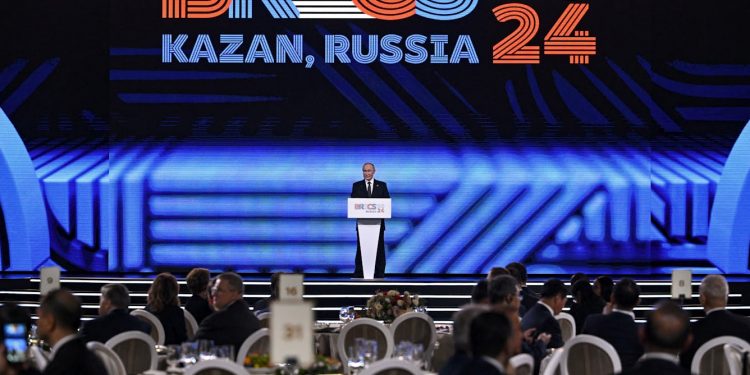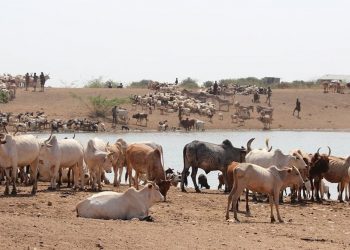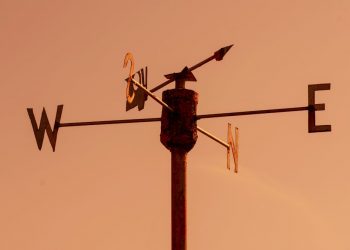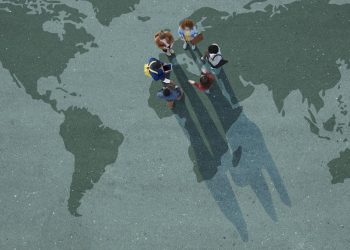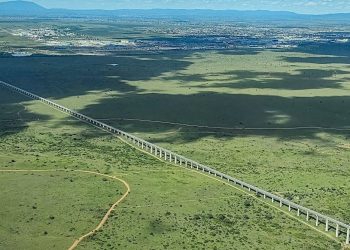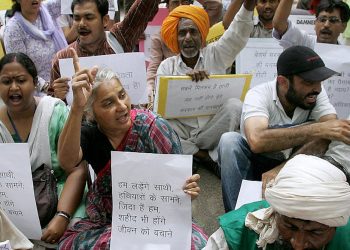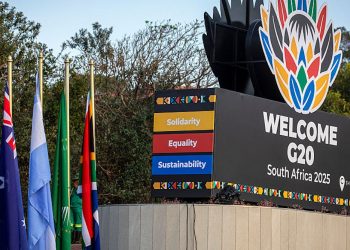During its 16th annual summit in Kazan, Russia, Brics – a group of emerging economies determined to act as a counterweight to the west and to whittle down the influence of global institutions – invited Nigeria and eight other countries to join it as “partner” countries. Nigeria formally accepted the invitation in January 2025. That invitation has generated questions about how Nigeria stands to benefit, especially when US president Donald Trump is threatening to sanction members of the group if they replace the US dollar as reserve currency. It was established in 2006 and initially composed of Brazil, Russia, India, and China. South Africa joined in 2010 and the bloc added four new members (Egypt, Ethiopia, Iran and the United Arab Emirates) in 2023. In this interview, development economist Stephen Onyeiwu argues that Nigeria stands to gain from a Brics partnership, but would have to carefully balance its domestic interests with those of its western allies and Brics.
What does it mean to be a Brics ‘partner’ country?
The introduction of Brics partnership is an expansion mechanism designed to bring in more participants without giving them full membership. It is akin to “observer” status.
Brics partners can participate in special sessions of summits and foreign ministers’ meetings, as well as other high-level events. Partners can also contribute to the organisation’s official documents and policy statements.
But partners cannot host annual Brics summits or determine the venue. Neither can they select new members and partners.
How beneficial is Brics partnership to Nigeria?
The main benefit would be access to finance offered by Brics’ New Development Bank.
The New Development Bank was established as an alternative to western-dominated international financial institutions like the World Bank and International Monetary Fund. These institutions are sometimes used by the leading western countries to keep developing countries in line on global issues.
Some developing countries are reluctant to criticise western countries for fear of losing access to funding by western-backed international financial institutions.
Nigeria has been running a budget deficit of about 5% of GDP since 2019, and it needs funding to pay for the deficits. The New Development Bank could be an important source of funding for investment in Nigeria’s infrastructure, manufacturing, agriculture, and so on.
New Development Bank loans are also available in member countries’ local currencies. They don’t have to earn foreign exchange to repay the loans. This fosters exchange rate stability and promotes economic growth. The New Development Bank raises funds in member countries’ local currencies, and lends them to member countries.
Nigeria could use its Brics partnership to garner the group’s support in matters that affect Nigeria globally. For instance, there have been requests for African countries to be included as permanent members (without veto power) of the UN security council. South Africa and Nigeria have been touted as potential candidates. Should this issue be raised at the UN, Nigeria can count on the support of its Brics allies, which includes two permanent members (China and Russia) of the security council.
Mutual understanding and cooperation with other Brics members and partners might spill over into economic, trade and investment agreements. Friendly countries are more likely to trade with each other and invest in each other’s economy.
How can Nigeria maximise its status as a Brics partner?
Nigeria should use it to attract foreign direct investment in strategic sectors of the economy, such as infrastructure, manufacturing, agriculture and technology.
Some Brics members, like China, India, and the UAE, have investors that are seeking investment outlets abroad. Nigeria could use the bloc’s annual summits to showcase investment opportunities.
The global economy is transitioning into “frontier industries and technologies”, such as big data, artificial intelligence, solar, drones, gene editing, 3D printing, blockchains, Internet of Things (IoT), 5G, robotics and nanotechnology. China, India and Brazil are already well advanced in these technologies.
Nigeria should use its partnership with these countries to build capabilities in frontier industries and technologies. It could get favourable terms in the transfer of these technologies.
Nigeria seeks to diversify its economy from reliance on the export of hydrocarbons. But Nigerian producers have had a hard time accessing global markets. The country should negotiate trade deals that provide access to Brics markets, especially agricultural and agro-processed products, arts and crafts.
But Nigeria has to promote economic growth and structural transformation at home. If the Nigerian economy falters, it is unlikely the country will be invited to become a full member of Brics.
Would adding new members and partners reduce western dominance?
Brics has so far not been able to significantly change the dynamics of the international political economy. Adding new members and partners, while symbolic, will not act as an effective counterweight to the influence of the G7 and G20 groups of nations.
Most of the countries and partners in Brics are either allies of western countries or neutral on global issues. They are unlikely to support decisions or actions that are grossly inimical to western interests.
Egypt and the UAE, for instance, receive military aid from the United States. Ethiopia and Nigeria are top recipients of foreign aid in Africa, much of it from western-backed financial institutions.
The only outlier in the mix is Iran, whose membership was promoted by Russia. But Iran has no leverage to influence others in the bloc.
On balance, therefore, Brics will not be a threat to western countries.
Brics aspires to weaken the dominance of the US dollar for international transactions. Close to 90% of international trade transactions are conducted with the US dollar.
Brics countries plan to reduce dollar dominance by encouraging member countries to settle their trade and financial transactions using their domestic currencies. For instance, South African businesses could purchase Chinese goods using the South African rand, while the Chinese could do the same for South African goods using the Chinese yuan. The more members you have in Brics swapping their currencies, the less important the US dollar will be.
It is unlikely, however, that an increase in the number of Brics members and partners will weaken the dollar. Most will continue to have significant economic relationships with the west, including trade and foreign aid.
They will also continue to conduct business with many non-Brics countries, which also have economic relationships with the west. They will need the US dollar to transact with many other countries.
So increasing the number of Brics members and partners does not pose a threat to dollar dominance.
Stephen Onyeiwu does not work for, consult, own shares in or receive funding from any company or organisation that would benefit from this article, and has disclosed no relevant affiliations beyond their academic appointment.

